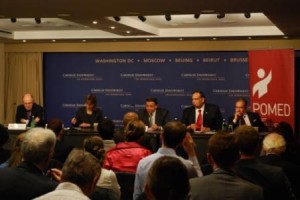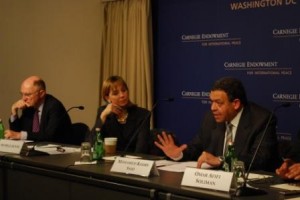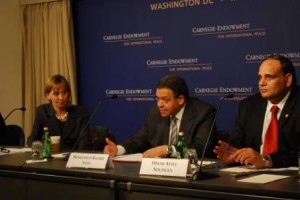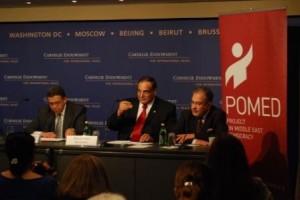Egypt on the Brink
Presented by the Carnegie Endowment and the Project on Middle East Democracy
When Egyptian opposition groups called for a “Day of Rage” on January 25, few predicted that the protests would escalate into a full-fledged uprising that threatens to unravel Egypt’s existing political order. As hundreds of thousands of Egyptians call for an end to President Mubarak’s 30-year rule, the crisis unfolding in Egypt has the potential to fundamentally transform Egypt’s political landscape and the balance of power in the Middle East. Will these protests ultimately lead to a more transparent and democratic political processes in Egypt? What impact may we expect across the Middle East? And what do these events mean for U.S. relations with Egypt and the region?
Featuring:
To read full notes, continue below or click here for pdf.
Michele Dunne opened by mentioning the clashes in recent days between pro-regime and anti-regime demonstrators and the arrest and detainment of human rights activists by the security forces. She noted the growing uncertainty of the role of the military in these clashes. Given the strong statements issued by Vice President Omar Suleiman and Prime Minister Ahmed Shafiq condemning the attacks and vowing to investigate the attacks, Dunne questioned whether there was a rift forming in the regime or if they were seeking to manipulate the populace with a “good cop-bad cop” tactic. Dunne also noted the conflicting reports surrounding negotiations between Suleiman and the opposition parties and ambiguity surrounding the U.S. government’s definition of “transition” in the Egypt context.
Amr Hamzawy, speaking from Cairo, spoke about the concessions made by the government, such Suleiman saying that they are open to constitutional amendments beyond Article 76 and 77. Furthermore, Hamzawy optimistically discussed the road map for the transitional period stating the Suleiman was entering into dialogue with all opposition groups, including the Muslim Brotherhood. He made mention of Suleiman’s speech in which he promised to investigate and punish the organizers of the attacks and release all detained protesters and activists not involved in violence on Wednesday.
Hamzawy stated that Suleiman’s unwillingness to dissolve the parliament, out of the interest of having enough time to make constitutional amendments before the transition period ends, will likely be a point of contestation among the different opposition groups, which had demanded dissolution of parliament after the blatant election violations by the regime last November. He also states that going into this transition period constitutional and political safeguards need to be put in place to ensure that the regime does not violate its commitment to reform and that the army will play a key role in ensuring stability during this period as well.
When asked about Mubarak’s role, Hamzawy states that many of the opposition groups, not including the Muslim Brotherhood or Mohamed ElBaradei, have agreed to have Mubarak continue on as an “honorary president,” with all essential powers delegated to Suleiman. He calls this a “face-saving” method that reaches out to the sentimentalities of Egyptians and will help manage a safe transition. It is clear, however, that some people will be upset, but others are willing to make the compromise for stability and in hopes of returning to normality.
Responding to a question on amendments to Article 88 on judicial supervision of elections, Hamzawy said that the new amendment will lead to the formation of an independent election commission made after consultations with independent judges, legal experts, and scholars.
When asked how a parliament full of members of the dying NDP can be expected to make full constitutional amendments demanded by the people, Hamzawy states that Suleiman has offered to re-run elections into those areas where the Constitution Court found to have suffered from voting fraud; this means over 250 seats will be contested. Until these elections are run the parliament has been suspended.
Hamzawy states that while debates still continue, many protesters are moving towards no protests tomorrow and supporting the road map. He states that the transition period will be tough as some try to backslide into the old regime, but he believes the protesters are resilient and will ensure demands are met credibly.
Bahey al-Din Hassan began by stating is respect and pride for Egyptians who continue to struggle in face of the violence which has killed at least 500 and injured thousands more. He went on to discuss the arrests of journalists and human rights activists that occurred on Thursday, noting that this the first time the military police has participated. Not only did the military police arrest activists with the thugs, they also closed all outlets in Tahrir Square leading Hassan to believe that in coming days we may see a humanitarian crisis take place on the streets.
The opposition Hassan said is divided and weak as they have been under severe and continuous repression under Mubarak, and really, in his opinion, since July 1952 when the “Free Officers” coup took place. Currently, he states, Egyptians have a minimum consensus over who the leader of the opposition should be and that is ElBaradei. He states that the opposition groups really need to stick behind him instead of engaging in independent consultations with Suleiman. He also argues that while ElBaradei refused to negotiate until Mubarak had departed, he should shift his position given the realities on the ground.
Neil Hicks began by discussing past opposition movements in Egypt, stating that in the 1980s the groups were smaller and tended to include lawyers and members of the middle class, who had limited objectives. In recent years, he says, there has been a change in the ambition of the people. The youth have constructed their own networks and outreach tactics, which older generations did not support or see as useful. But demonstrations on the 25th showed the value of the youth networks, especially those put in place to monitor the November elections; they were able to mobilize the masses effectively. Hicks credits this transformation with the maturation of human rights groups and NGOs in Egypt and labels ElBaradei as the father of this change, which is indigenous and authentic to the people, not imposed by the U.S. or the West.
Addressing U.S. policy in the region, Hicks said that the administration and congress are behind the curve. Mubarak’s early comment that the Egyptian people can choose between stability and chaos was misinterpreted in the West, Hicks said; the statement was meant as a threat, saying that if things don’t go his way there will be chaos. And as protesters failed to give into his demands chaos ensued as he shut down the internet and sent tourists home, costing the country billions of dollars. The regime, Hicks says, was fraying; it was beginning to lose its ability to maintain stability and control as demonstrated by the beating of Khalid Said and the blatant rigging of elections; they were scared they would lose. The blatant violations during the elections should have garnered a stronger response from the Obama administration, Hicks said.
If Mubarak stays in power, he will do so as the Mugabe of Egypt. Hicks called on the administration to make clear that it does not see Mubarak as having an effective or useful role in the transition and have him step down. While appreciative of Hamzawy’s optimistic assessment of Suleiman, Hicks cautions against quickly embracing him as a leader. The U.S. also needs to ensure the army protects demonstrators and make it abundantly clear to the military leaders that the army must not be involved in violence as it will lead to cutting aid and a deterioration of their relationship, which the Egyptian army values highly. He also calls on the administration to push for the release of activists arrested today.
Answering a question on the Muslim Brotherhood, Hassan stated that while they are the most organized there is a great deal of exaggeration on their actual weight and influence. This protest movement was organized by the youth with a labor background, not an Islamist one. The Brotherhood, he says, lacks any real influence on what’s happening in the streets much like the Islamic group Ennahda does in Tunisia. The state, Hassan claims, has issued exaggerated claims in the hopes of shifting international opinion in their favor instead of in the favor of protesters who are demanding political reform. He goes on to say that if the protest movements fail to bring real reform to the country, the tides will turn in the favor of the Islamists.
Addressing questions over the military, Hicks stated that the U.S. and Egyptian military officials have been communicating and that the U.S. should continue to encourage the army to protect protesters and live up to the ethos of professionalism. When it comes to cutting off aid, Hicks says the U.S. should draw clear red lines that if crossed would lead to cuts in aid. Hicks also addressed the possibility of a military coup in Egypt, stating that essentially that is what took place in Tunisia as protests grew though the possibility remains unclear in Egypt.
Dunne answered a question over the lack of democratic terms in Suleiman’s speech by stating that she is skeptic of what Suleiman said. While he has offered some change and reform it is unclear whether he will allow free and fair elections to take place or if he is attempting to pass limited reform aimed at quelling the unrest. Hassan states that in Egypt it is better to have a quick transition towards democracy as true democracy will decades to build in the country and that movements need to start sooner rather than later. Hassan believes that demonstrations will continue tomorrow as people push for transition knowing that this is the best way to have their demands realized.
When asked about rifts between the NDP and the military, Hicks stated that we had seen a fracturing between the two groups as Mubarak became aligned with the economic elite members of the NDP. In recent weeks he has attempted to make a shift back towards the military as seen by his selection of Vice President and Prime Minister. Hicks also questions whether Mubarak’s abandonment of the business elite could lead to the formation of new party.
Addressing questions regarding skepticism that the U.S. will cut aid, Hicks stated that he too was skeptical but given that the events on the ground are changing so rapidly, U.S policy will have to adapt. What is clear is that the reluctance of the U.S. to call out violations of close allies will no longer be accepted.
Finally, answering a question on whether a new party will be able to survive if they cannot address the domestic economic issues facing the country, Hassan stated it is unlikely. However, he said that the people recognize that economic reform cannot take place without political reform; it is a key first step.



